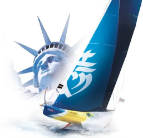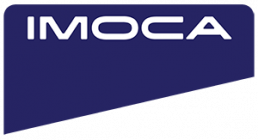
The imoca class and its imoca globe series championship
60-foot (18.28m) monohulls have been contesting the Vendée Globe since its creation back in 1989. In 1991, Christophe Auguin, Isabelle Autissier, Alain Gautier and Jean-Luc Van Den Heede created the IMOCA Class (International Monohull Open Class Association), which has been recognised since 1998 by World Sailing (previously known as the International Sailing Federation). IMOCA represents the skippers who are members of its association and outlines the rules, which guarantee the sporting equity and safety of the boats, whilst favouring innovation.
The Class contributes to the internationalisation of offshore racing by developing a comprehensive sporting calendar within its IMOCA Globe Series Championship, which is qualifying for the Vendée Globe. On a daily basis, it combines the notions of competition, creativity, a flair for the collective and the transition towards more sustainable performance. IMOCA’s Executive Committee currently comprises Antoine Mermod (President since May 2017), Jérémie Beyou, Arnaud Boissières, Louis Burton, Kevin Escoffier, Charles Euverte, Boris Herrmann and Paul Meilhat. Three committees also work within the Class with the focus on sport, technicality and sustainability respectively.
30 years of technological revolution
The initial class measurement was a direct interpretation of the race rules from the BOC Challenge 1988-1989 and the Vendée Globe 1989-1990: the yacht shall be a monohull measuring between 59 and 60-feet (17.98m and 18.28m) in length with its heel angle limited to 10 degrees. Since then, the IMOCA Class has continued to evolve and is now one of the fastest and most spectacular offshore monohulls in the world.
Contrary to one-design classes, IMOCA is an open class. “Anything which is not expressly forbidden, restricted or enforced is permitted,” explain the Class Rules, which are revised and voted on each year. The modern IMOCAs are characterised by beamy and powerful hulls, canting keels, pivoting wing masts and – since the last edition of the Vendée Globe – foils. The latest generation boats sail at a peak speed of up to 40 knots… which is twice as fast as the first IMOCAs. In 1990, Titouan Lamazou completed the Vendée Globe in 109 days and Armel Le Cléac’h took 74 days in 2016. Observers attest that the event record could be beaten in 2020-21… A circumnavigation of the globe in less than 70 days?
The international offshore racing championship
In 2018, the Class inaugurated the IMOCA Globe Series: its four-year championship including two ‘star’ round the world events, the Vendée Globe (singlehanded) and The Ocean Race (mixed crew), as well as the Route du Rhum, the Transat Jacques Vabre, the Transat NY-Vendée, etc. In this way, this annual programme enables the teams to develop a structure over the long term and to carry out continuous technological developments, whilst providing a comprehensive activation solution to their partners. At the start of the Vendée Globe, over 130 companies and organisations are supporting the fleet of 33 skippers.
All the events count towards qualification for the Vendée Globe and, at the end, each cycle crowns an IMOCA Champion. At the start on 8 November, it is German skipper Boris Herrmann (Seaexplorer-YC de Monaco) who is top of the provisional ranking for IMOCA skippers (236 points), followed by Fabrice Amedeo (217 points) and Jérémie Beyou (212 points), view the ranking here. Who will be the IMOCA Champion 2018-21? Response at the finish of the Vendée Globe!
And tomorrow? On 27 August 2020, the sports programme for the IMOCA Globe Series 2021-25 was voted on at the General Meeting with a unique schedule of 18 races, two round the world events and 14 countries visited (a record)! “We’re offering up the finest programme there is, with the major international offshore racing meets grouped together in the same IMOCA Globe Series calendar. The IMOCAs are competitive, innovative and spectacular boats sailed by super competent sailors who remain accessible to and closely involved with the public. They are also increasingly committed to the development of our sport and its role within society,” explains Antoine Mermod, President of the IMOCA Class.
United in the quest for more sustainable performance
In its development, IMOCA is constantly focused on developing collective thinking and innovation in a bid to break new ground and adapt its rules and practices for the good of the environment. For example, the IMOCA Class has signed a partnership with UNESCO’s Intergovernmental Oceanographic Commission, JCOMMOPS and PlanktonPlanet to help scientists to better understand the remotest zones on the planet where commercial vessels or scientists do not venture. During the Vendée Globe, the skippers are carrying four types of instruments (laboratory, Argo float, smart weather buoy, plankton scope) in order to gather data and samples throughout the circumnavigation of the globe.






